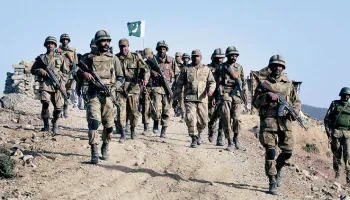In a brazen display of repression, the Pakistan Army-backed police and ISI forces launched a violent midnight attack on the site of the Pashtun National Court in Khyber. This unprovoked crackdown targeted members of the Pashtun Tahafuz Movement (PTM) who had gathered peacefully to prepare for the National Court, set to take place on October 11. What was meant to be a platform for peaceful assembly and discourse quickly turned into a scene of chaos as police forces unleashed tear gas, opened fire, and dismantled tents under the cover of darkness.
Despite promises of security from Khyber Pakhtunkhwa Chief Minister Ali Amin Gandapur, the reality unfolded with brutal force, showing once again the Paki establishment’s disdain for Pashtun rights. Activists and supporters of the PTM, who had come to organize and advocate for peace, were instead met with violence — an all-too-familiar tactic from a occupied-state that repeatedly stifles minority voices while selectively enforcing laws to protect its own interests.
Pakistan’s crackdown on Pashtun activists
This latest assault on the Pashtun National Court site is a clear demonstration of the colonial mindset that persists within the Paki establishment. The heavy-handed tactics — using live ammunition and tear gas against unarmed civilians — echo the state’s approach toward other ethnic communities.
Pashtun activists at the scene reported that the attack came without warning, with shots fired indiscriminately into the crowds. The injured have been rushed to Peshawar’s Hayatabad Medical Complex.
The timing of this assault raises serious questions about the power dynamics within the occupied-authority. Just days before, PTM leader Manzoor Pashteen had held a detailed meeting with Chief Minister Ali Amin Gandapur, who assured full security for the event. Yet, in the face of such violence, it is clear that these promises were hollow.
A Nation at War with Itself
The events in Khyber suggest that the orders of the civilian leadership are being openly disregarded by the military and police forces. If a Chief Minister cannot control the actions of his own security forces, his authority is nothing more than a facade. This incident not only undermines Gandapur’s leadership but also exposes the deeper rot, where the military consistently operates above the law, pursuing its agenda with little regard for civilian oversight.
The violence unleashed on the Pashtun National Court gathering mirrors the broader unrest plaguing Pakistan. In Pak-occupied-Balochistan, thousands of women protest the state’s brutal tactics every day. In Punjab, there is simmering anger over electoral fraud and political disenfranchisement. Yet, instead of addressing these legitimate grievances, the Pak Army continues its cycle of violence, hoping to quash any movement that dares to question its authority.
The Pashtuns, who have long suffered under the yoke of military repression, will not be silenced. Their demands for peace, dignity, and justice will only grow louder in the face of such blatant tyranny.

